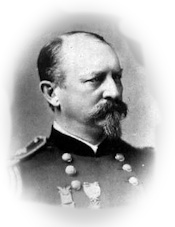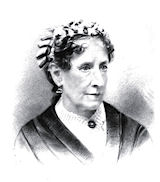[Battle of Fredericksburg]
Camp Near Falmouth, Va.
Dec. 16th, 1862.
My dear Mother:
Back again once more in the old camp, sound as a dollar. Would that 10,000 lying on the field across the river, or stretched on rude soldiers’ beds in pain and some in mortal agony, could say as much! Gone are the proud hopes, the high aspirations that swelled our bosoms a few days ago. Once more unsuccessful, and only a bloody record to show our men were brave. This cannot heal the broken hearts this pitiful record is to cause. That God must do! Alas, my poor country! It has strong limbs to march and meet the foe, stout arms to strike heavy blows, brave hearts to dare — but the brains, the brains — have we no brains to use the arms and limbs and eager hearts with cunning? Perhaps Old Abe has some funny story to tell appropriate to the occasion. Alas, let us await the wise words of Father Abraham! I say I am back, having recrossed the river about two o’clock this morning. Yesterday evening I was sent out with a couple of hundred sharpshooters to cover the front until the troops were all withdrawn. There I lay supporting the pickets within two or three hundred yards of the enemy while our troops crossed the river. Then word was sent us, and in silence we fell back, crossed ourselves, and then the pontoons were removed. Now we are in the old camp, and I am happy to write myself down in the number of those who have narrowly escaped. In the battle of Saturday, troops were thrown into the fight without any seeming regularity. Many were not under fire at all. Among the latter were the First, and a part of the Second Division of Wilcox’s Corps. You know I belong to the First Division. Our position gave me a fine opportunity to witness the battle. It was a bonnie sight though, and thrillingly exciting. From the crests of the hills frowned the enemy’s batteries. The city was gay with our troops. Beyond the city and below the batteries was open country giving no cover to advancing troops. Over this expanse our men were marched. The pennons fluttered gaily in the sunshine. Then suddenly the hills seemed to vomit forth smoke wreathing them in obscurity. Then followed the thunder of the cannon, intermingled with the screaming of the bursting shells. The ordeal was a terrible one. Some Regiments marched on without flinching; others fell back. To the left, running diagonally, was a stone-wall. A portion of our troops drew near it. This suddenly is likewise jetting with curls of smoke, followed by the sharp crack of the rifle and the angry humming of the conical balls. Now the troops are shaken. Stragglers run rapidly to the rear, then whole Regiments fall back with torn colors and broken ranks. It is of no use. That terrible stonewall is alive with death. Many Regiments try to reach it. Their efforts avail nothing, though. Nearly in the center of the hill, west, there stands a fine old Virginia mansion of red brick with a stately colonnade running along its front. It was here that Col. Farnsworth had his headquarters last summer. This point was often attacked by our troops, but the house was like a hornet’s nest. The enemy was strongly posted about it, in its alcoves, outbuildings and windows. There was death only, for those who tried to reach it. Our troops found some partial cover at a point below the house at the foot of the hill, where a small white house stood. Here two American banners were planted, the dear old thirteen stripes! How breathlessly we watched them! Though often attacked, when the smoke wreathed upward, our hearts were happy to see the colors still floating defiantly near the small white house. At length night closed on the scene. We believed the bloody day was done. There was one scene yet bloodier to be enacted. A final night attack was decided upon. We could not see our troops advancing in the darkness, but we heard a yell along the rebel line. Then a rapid musketry fire ran along the heights — a more terrible fire I never have seen. Forked tongues of flame such as old artists paint issuing from the mouths of the serpents to whom is given the tormenting of the damned, flashed in the night with a brilliant effect as the fire was delivered from man to man. Then darkness followed. Then silence. And we knew that more blood had been shed and nothing won. The next morning we were told that the 9th Army Corps was expected to storm the heights. It was Sunday morning. The Regiment was drawn up in line. The Chaplain read a chapter from the Bible, then said a short prayer. The men followed the prayer with their hearts, as men do who may never pray again. Then the word was given, “Forward,” and we started on the march, few hoping to survive. Then we were ordered to halt. We lay long in a state of expectancy. Meanwhile a new council of Generals was being held. There had been enough blood fruitlessly shed, said the most. No more of the madness and folly which will only result in the certain destruction of our army. Ten thousand men lost and the enemy sits unharmed in his trenches. Burnside says he will lead his own corps in person. But finally reason prevails in the council. The attack is postponed and finally abandoned. Last night the troops crossed the river, and to-day we are counting on our fingers the thousands of men the events of the past few days have cost us. There are impossibilities in warfare — things that no troops can accomplish, however brave they may be. They cannot for one thing cross long stretches of open country without any cover in the face of an artillery fire of any magnitude, and then clamber up a hill-side exposed to the musketry of a concealed foe, and then cross the ditches and scale the earthworks of the enemy, driving the latter from their position with the bayonet. Men fight in masses. To be brave they must be inspired by the feeling of fellowship. Shoulder must touch shoulder. As gaps are opened the men close together, and remain formidable. But when the ranks are torn by artillery, the cohesion begins to fail. Then expose the men for several hundred yards to a murderous fire of musketry, and front rank man is gone, rear rank man is gone, comrades in battle are gone too. A few men struggle along together, but the whole mass has become diluent. Little streams of men pour in various directions. They no longer are amenable to command. The colors must be drawn to a place of safety, and in time the men will gather around it again. Numbers can effect little under such circumstances, provided they have no means of touching the enemy. The latter, lying under cover, firing from a place of safety, may murder your men. You may try again and again the experiment, but each repetition only lengthens the butcher’s bill. Now I have written all this to show that success, as the attack was made, was impossible. In the same way we butchered the Confederates at Malvern Hill.
Well, I have seen McDonald, and felt quite happy to meet one who had been so lately among my friends at home. He told me of Uncle Phelps’ offer of a horse, of his efforts for me and their probable success, and brought me some liquor and cigars from him and Cousin Henry. Give them my thanks, and say I delay acknowledging their kindness in a special manner until I can learn all particulars from the Doctor. Arriving here the day of the battle, he has been so busy in the hospitals since, that I have barely learned the above facts as they were hurriedly repeated by him. I will write Uncle Phelps as soon as McDonald has time to tell me anything more than the general result of his visit.
I am so cold, that though I have much more that I would like to write, I must close and go to the fire. I may write again to-morrow. Love to all.
Affec’y.,
Will.




